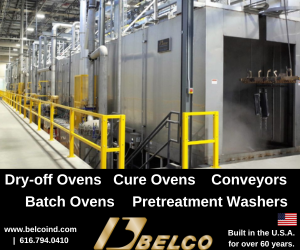Stripping Powder Coatings
Alternative stripper offers a safer way to remove coatings . . .
The need for an environmentally safe, user friendly paint stripper that works as well as cold solvent strippers containing methylene chloride has been a pressing issue for finishers. Since 1997, OSHA and EPA have placed serious restrictions on the use of methylene chloride.
A goal in developing a safe alternative stripper was to meet regulatory restrictions, improve performance and meet customer needs for a user-friendly product.
The alternative stripper is a single-phase stripping technology that combines an organic solvent and a moderately strong acid in a homogenous solution. Bath control involves titration to determine acid points. Replenishment is necessary if titration points fall below a certain number, in which case a replenisher is added to the bath to bring the titration back to working parameters. Water, a replenisher or more of the initial make-up product is added to make up volume lost during processing when the titration is incorrect.
The alternative metal stripper was compared to similar low-temperature alkaline strippers on steel substrates. For comparison to stripping powder coatings from aluminum, methylene chloride and hot alkaline strippers were used.
Several Q panels of different substrates were powder coated with four types of powder at three dry-film thicknesses. The panels were pretreated with a molybdate-accelerated iron phosphate before painting. Black polyester, black epoxy-polyester hybrid, black polyurethane and black epoxy powder coatings were used. All powder coatings were cured according to manufacturer specifications.
The time to 100% strip 1, 2 and 3 mils of powder at 140 and 160F was recorded. Results showed that the alternative stripper was comparable, if not better, in performance to the hot alkaline stripper, removing epoxy and hybrid coatings faster.
The alternative stripper was compared to a methylene-chloride-based stripper and a hot alkaline stripper on removing powder coating from aluminum panels. The same powder coatings were used at a dry-film thickness of 3 mils. The hot alkaline stripper was used at 70% by weight with mild agitation at 140 and 160F. The methylene-chloride-based stripper was used at room temperature. Results indicated that the alternative stripper performed better at removing epoxy powder coatings. It performed similarly to the stripper tested on hybrid and polyurethane paints and stripped polyester paint at a slower rate.
One component of the alternative stripper is an acid that is low in corrosivity, odor, toxicity and is biodegradable. This dual chemistry functionality places both alcohol and a moderately strong acid functional group on the same molecule. The acid component contributes to the unusual solvency properties. The performance of the product was examined by varying the percent by weight of the acid. The test was conducted on aluminum coupons coated with approximately 3 mils of epoxy paint. The stripper was used at 100% with slight agitation at a 160F.
The alternative stripper effectively stripped tenacious coatings from virtually all substrates, including aluminum, at lower temperatures and faster when compared to traditional stripping systems. This contributes to energy and water conservation. It is user friendly, strips in sheets, is easy to control and offers minimal safety, environmental and health risks compared to methylene chloride and hot alkaline strippers. On-going field tests have verified that, due to its stripping mechanism, removing stripped paint requires just a mesh screen most of the time.
| TABLE I—Features and Benefits | |
| FEATURE: | BENEFITS: |
| Operating temperatures of 100-180F | Lower energy costs |
| No reportable SARA 313 ingredients | Cost savings related to handling and disposal |
| Inhibition, resulting in safe use on virtually all metals, including most aluminums | One product is used for multi-metal processing |
| Inhibition, resulting in safe use on virtually all metals, including most aluminums | One product is used for multi-metal processing |
| Most paint sheets off in entire layers, similar to stripping mechanism of methylene chloride | Allows recycling, lower waste volume and longer bath life |
| Easy to use and control | Lower processing costs |
| TABLE II—Time in Minutes to 100% Strip One Mil of Powder Coating | ||||
| Hot Alkaline Stripper | New Stripper | |||
| Paint Epoxy Hybrid Polyester Polyurethane |
140F 5 30 45 20 |
160F 2 20 30 14 |
140F 2 12 50 18 |
160F 45 seconds 10 30 12 |
| TABLE III—Time in Minutes to 100% Strip Three Mils of Powder Coating | ||||
| Stripper Hot Alkaline @ 140F Hot Alkaline @ 160F Methylene Chloride @ RT New Stripper @ 140F New Stripper @ 160F |
Epoxy 15 6 240 10 3 |
Hybrid 10 5 60 12 8 |
Polyester 15 6 90 25 15 |
Polyurethane 5 3 180 5 3 |
| TABLE IV—Performance of Stripper Based on Acid Concentration | |
| Percent Acid 5.0 6.0 7.5 9.0 10.0 12.5 15.0 17.5 20.0 |
Stripping Time (In Minutes) 3 3 3 2 2 2 2 6 9 |
Read Next
Education Bringing Cleaning to Machining
Debuting new speakers and cleaning technology content during this half-day workshop co-located with IMTS 2024.
Read MoreDelivering Increased Benefits to Greenhouse Films
Baystar's Borstar technology is helping customers deliver better, more reliable production methods to greenhouse agriculture.
Read MoreEpisode 45: An Interview with Chandler Mancuso, MacDermid Envio Solutions
Chandler Mancuso, technical director with MacDermid Envio discusses updating your wastewater treatment system and implementing materials recycling solutions to increase efficiencies, control costs and reduce environmental impact.
Read More























.jpg;maxWidth=300;quality=90)




